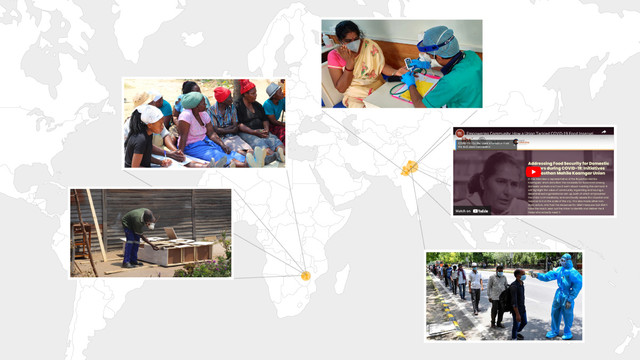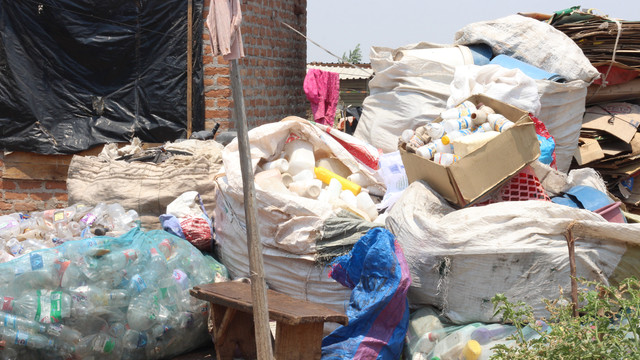COVID-19: IIED in the media
This page highlights the analysis and expertise IIED's researchers are providing to the media on issues related to the coronavirus outbreak.
The COVID-19 pandemic is an extreme event; the current global health crisis will have significant and long-lasting repercussions for communities, markets and sustainable development around the world.
Our researchers are providing analysis, comment and specialist expertise on the impacts and future implications of this huge global challenge, from focusing on the vulnerability of the world’s poorest communities to looking at how we can manage a fair and sustainable recovery. This page highlights some of their contributions:
9 October 2020 | Ensia – In the face of COVID-19, how can conservation efforts reduce poaching and limit the risk of spreading disease? IIED’s Dilys Roe says the solution lies in communities, “involving them as game guards, making sure they benefit from wildlife, that the costs of living with wildlife are minimised, and ensuring they have alternative ways of making a living other than poaching”.
9 September 2020 | Christian Science Monitor – As governments and institutions gather to address the economic impact of COVID-19, a new IIED report shows they have an opportunity to tackle debt, climate and biodiversity loss together. Large-scale debt swaps would help tackle poverty and environmental destruction as debtor nations must do what they promise in these areas as part of a “results-based” system of payment, said Paul Steele, IIED’s chief economist and joint-report author.
27 May 2020 | Thomson Reuters Foundation – Lorenzo Cotula, IIED's principal researcher on law and sustainable development, writes that reports suggest the COVID-19 fallout is providing opportunities for elites to seize lands and rewrite regulations. Effective responses are needed now in order to protect land rights and lay the foundations for a just recovery after the pandemic.
15 May 2020 | Mail Online – As plans on how to change the way we work and live once the COVID-19 lockdown is lifted, senior researcher Sam Greene reminds: "There's an opportunity not to talk about what we have to have less of [to deal with climate change] but how we can create a more just and resilient future."
13 May 2020 | Thomson Reuters Foundation – As business looks to how it can speed post-COVID-19 economic recovery, Laura Kelly, director of IIED's Shaping Sustainable Markets research group, writes its policies need to be green and social so the Sustainable Development Goals can be met and 20 years of development gains in the poorest countries are not wiped out.
29 April 2020 | Thomson Reuters Foundation – In an opinion piece, IIED director Andrew Norton writes that COVID-19 risks exacerbating inequality and ecological destruction, but it may also bring lessons of environmental and social justice that shift values, strengthen solidarity and encourage people to mobilise for change.
22 April 2020 | BBC – On Earth Day, IIED director Andrew Norton says that "while the COVID-19 pandemic will lead to a temporary dip in global greenhouse gas emissions, this must not distract from the urgent need for rapid fundamental changes in infrastructure, energy, land use and industrial systems to set us on a path to net zero emissions globally by 2050 at the latest".
17 April 2020 | ABC Radio National – The effects of COVID-19 are hitting Asia hard. Cecilia Tacoli, IIED's principal researcher on urban issues, says much more needs to be done to help the urban poor to withstand the crisis and to reform cities so they benefit people living in informal settlements.
13 April 2020 | Devdiscourse ― Controlling the sale and eating of wild species in order to stop the spread of pandemics like COVID-19 is now facing criticism from a number of environmentalists. Dilys Roe, IIED’s principal researcher on biodiversity, recommends sustainable use of wild animals by local communities, urging "we need to ensure people living with and alongside wildlife are empowered to use it and benefit from it in ways that incentivise the long-term conservation of species and habitat, and support their livelihoods."
7 April 2020 | Yale Environment 360 – Looking at how the fight to tackle climate change will look in a post-COVID-19 world, IIED director Andrew Norton warns “If handled badly, the pandemic could suck the energy out of public action and public policy.”
2 April 2020 | Reuters – With the coronavirus causing the UN climate summit (COP26) to be postponed until 2021, IIED director Andrew Norton says that as well as stimulating their own economies, rich nations need to give financial help for the poorest facing the climate crisis. He adds that the voices of people in the most vulnerable countries also must be heard in the climate change talks, "which without face-to-face meetings, is not possible".
30 March 2020 | Forbes – IIED director Andrew Norton warns that the COVID-19 pandemic “could distract attention and divert resources away from focusing on the climate crisis in the short term” following the postponement of the 2020 UN climate summit, and could also impact social movements’ ability to organise.
22 March 2020 | Al Jazeera – As Bangkok slum residents were preparing for the virus, IIED principal researcher Cecilia Tacoli highlights how, however important social distancing is, it is unrealistic for the world's poor who live in densely populated areas and lack water, sanitation and health services.
Tacoli and Eric Fèvre, a professor of veterinary infectious diseases at the University of Liverpool, recently wrote a blog about how weak infrastructure would leave urban settlements in low-income countries highly vulnerable should the rapid spread of COVID-19 continue.
18 March 2020 | Climate Home – Anna Schulz, IIED’s head of global climate law policy and governance, warns the virus could delay the start of least developed countries' nationally determined contributions development "if it impacts the capacity of partner organisations and funders to release funding”.
18 March 2020 | Guardian – As research suggests that infectious diseases like Ebola, Sars and COVID-19 are on the rise as access to previously untouched areas are now being accessed, IIED principal researcher Cecilia Tacoli and Eric Fèvre, a professor of veterinary infectious diseases at the University of Liverpool, are quoted saying: “Wet markets are considered part of the informal food trade that is often blamed for contributing to spreading disease. But… evidence shows the link between informal markets and disease is not always so clear cut.”
17 March 2020 | Thomson Reuters Foundation – IIED principal researcher Cecilia Tacoli cautions “given new infectious diseases will likely spread rapidly into and within cities, low-income settlements need more effective infrastructure”.
11 March 2020 | allAfrica.com – Responding to a story that the pandemic might nudge people toward new behaviours that could create lasting emissions cuts, Anna Schulz, IIED’s head of global climate law policy and governance, highlights how virtual conferencing isn’t for everyone. Depending on the internet for meetings is patchy in developing countries and would “further marginalise vulnerable voices”.
Media enquiries
If you are a journalist and would like a comment, interview and/or briefing, contact IIED head of media Beth Herzfeld on +44 (0)7557 658 482 or email beth.herzfeld@iied.org.
Further resources
See IIED’s press releases and media mentions on all of the institute’s work in our media centre.



